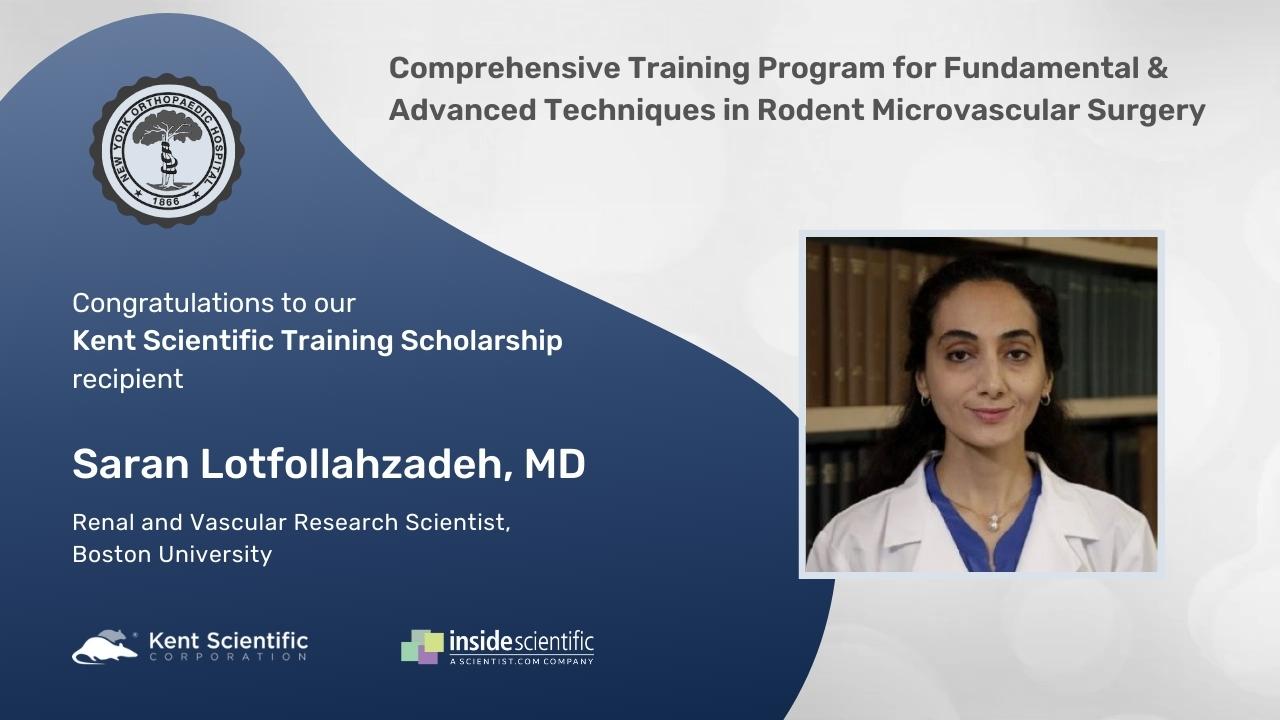Meet Saran Lotfollahzadeh, Vascular Surgeon and Rodent Microvascular Surgery Scholarship Recipient

Saran Lotfollahzadeh, MD, is a general surgeon with a pediatric surgery subspeciality and is also a research scientist at Boston University School of Medicine. She was granted a strategically-focused research fellowship by the American Heart Association to study the cardio-oncologolic mediators that are involved in cancer-associated thrombosis at the molecular level. Specifically, she is investigating those that are involved in health disparities with the indexes of dietary differences.
Recently, Saran won a Kent Scientific scholarship for the Comprehensive Training Program for Rodent Microvascular Surgery at Columbia University! We sat down with Saran to get an understanding of her motivation for applying to this scholarship, what she hoped to learn from this workshop, how these skills will help her conduct her research, and more.
What was your motivation for applying to this scholarship?
I have been doing vascular surgeries in both adult and pediatric patients, and I have been trying to translate my human surgery background to rodent models.
“I was eager to hone my skills … in this specific field because … I’m doing several of these novel rodent models in vascular surgery.”
I’m looking at things like ischemia, peripheral arterial disease, thrombosis, and inferior vena cava ligations. I wanted to not only hone these skills, but to also communicate with those who are more experienced in the field and to leverage these aspects of my translational research methodologically.
What did you learn in this surgical training workshop?
I was able to systematically observe a different type of arteriovenous fistula implantation in rat models. For both functionally working and training purposes, I learned the four different types of anastomosis that can be implanted in rat models.
What type of anesthesia did you use?
Fortunately, I was exposed to two different and really novel kinds of anesthesia machines: the SomnoFlo and SomnoSuite by Kent Scientific. These instruments have several specific advantages, including the ability to control the content and output of the anesthesia gas for minimal waste.
“It was so important for me because … in these ischemia/reperfusion and ischemic models, something which you need to normalize and [consider] while interpreting your data is the amount of inflow and outflow of oxygen. … Otherwise, you might … misinterpret your data.”
Avoiding these confounding factors with minimal manipulation and with an easy-to-use machine was so extraordinary. It definitely provides us with the ability to analyze different aspects of the data without being blurred by the confounding factor of uncontrolled gas waste.
What skill was the most difficult to learn?
I would not consider anything from the course to be difficult, but I found some things complicated and more intriguing to learn and absorb. One of the main advantages of this course was being exposed to 200x magnification, which allows you to provide functional anastomosis for longer periods of time. I’ve been doing mostly human studies, so this specific magnification and learning how to handle a microscope during surgery really fascinated me. Halfway through this course, I would definitely say that I was more confident with applying this magnification as well as handling different aspects of the microsurgery microscope.
How will these new skills help you with your research?
As far as I understand, what matters a lot in research is generating consistent data and limiting confounding factors as much as possible. In translational research, vascular biology and thrombosis studies are so demanding of how you can handle the tissue and how to provide the best skill in whatever vascular surgery you are planning for your experiment.
“The first and foremost goal for me during the experiment is not just having the foresight of what your … knowledge and background is going to provide for that experiment, but also how you can generate consistent [data] with less human factor error … to minimize the number and sample volume required for each and every experiment.”